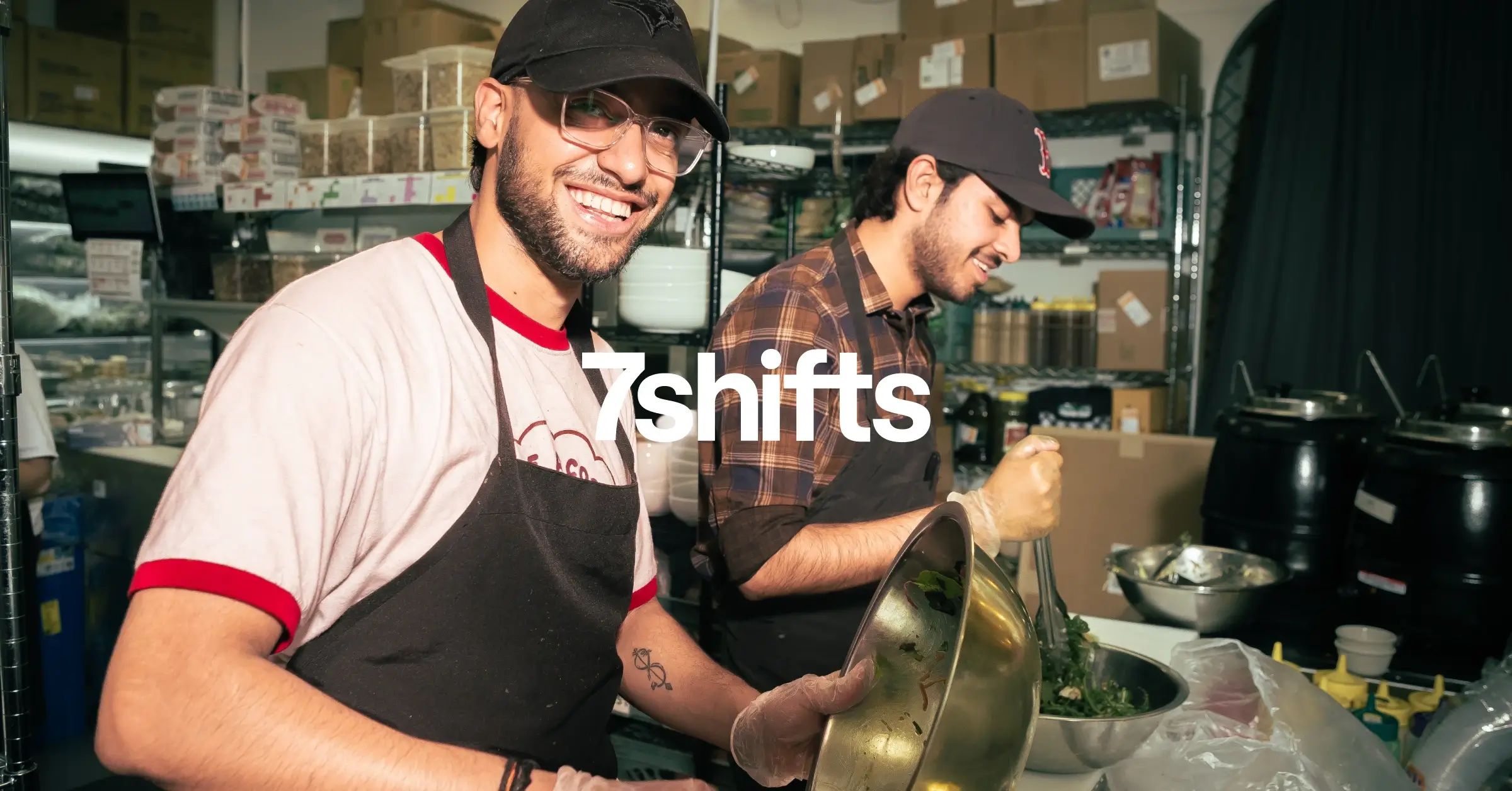A sous chef plays a bigger role in your kitchen than you think. They’re the one who fills in gaps before they become problems and the person who keeps the team moving when the pressure’s on.
If you’re tired of putting out fires and want more stability in your BOH, having the right sous chef can transform your kitchen, boosting efficiency and reducing stress for everyone, from your head chef to your dishwashers.
Let’s discover what a sous chef actually does, how they support your head chef, how much you can expect to pay them, and how you can find the best one for your team.
What’s the difference between a sous chef and a head chef?
In a restaurant kitchen, the head chef and sous chefs have distinct roles and responsibilities. Nonetheless, they’re both important to maintain smooth BOH operations.
The head chef, also known as the executive chef, sets the vision for the kitchen. They’re responsible for creating the menu, managing food costs, and overseeing the entire kitchen staff.
You can think of the head chef as the coach of a football team. They develop the game plan and guide everyone to understand what they have to do to win.
On the other hand, the sous chef is the second-in-command. They make sure the head chef’s vision is executed correctly on the ground.
If the head chef is the coach, the sous chef is the quarterback, leading the team during the game. They manage the line cooks, oversee food preparation, and step in wherever needed to keep the kitchen running smoothly.
Both positions in a restaurant are important because the head chef can’t be everywhere at once. The sous chef fills that gap, maintaining consistency and quality in every dish served. Without a reliable sous chef, the kitchen could face delays, inconsistent food quality, and increased stress among staff.
What is a sous chef?
As mentioned, the sous chef is the second-in-command in a restaurant kitchen, working directly under the executive chef. They make sure the kitchen operates smoothly and efficiently.
Key sous chef responsibilities
Sous chefs manage the kitchen staff, assigning tasks and overseeing each station to ensure that dishes are prepared correctly and on time. They’re responsible for maintaining order and efficiency during service.
They also handle quality control and serve as the last line of defense before a dish reaches the customer. Sous chefs taste and inspect dishes so that they meet the restaurant’s standards for flavor and presentation.
A key requirement to become a sous chef is to have comprehensive knowledge of every station. That way, they can step in wherever needed. If a line cook is overwhelmed or absent, the sous chef can quickly take over their station responsibilities, such as grilling meats, preparing sauces, or plating.
Additionally, this type of chef works closely with the head chef to develop new recipes and specials. They consider different techniques and processes so that the kitchen staff can execute them consistently and accurately.
Sous chefs are also instrumental in onboarding new staff, providing training, and setting the tone for kitchen culture and expectations. They make sure that new team members understand the technical skills required, as well as the team dynamics, communication protocols, and the restaurant’s food standards.
How much do sous chefs make, and what affects their pay?
The average chef salary in the US falls between $46,381 and $62,227. Sous chefs, in particular, have an average salary of $58,998 per year or $28 per hour, which varies based on location, restaurant type, experience, and skill level.
In high-end restaurants or metropolitan areas like Cupertino, CA, sous chefs can earn as much as $35 per hour. Fine dining establishments and Michelin-starred restaurants also often pay premium salaries.
If you’re looking to make the overall compensation package more enticing, additional benefits such as bonuses, profit-sharing, health insurance, and comped meals can add more value to your offer.
Beyond financial benefits, many chefs prioritize stable schedules, clear advancement paths, and a kitchen culture that values teamwork. In our restaurant workforce report, we found that retention remains one of the top three concerns among restaurant owners, with 65% describing the labor market as very competitive.
Offering consistent hours, leadership development programs, or even tuition support for culinary certifications can set your restaurant apart.
What to look for when hiring or promoting a sous chef
As you hire a restaurant chef, you should look beyond just cooking ability. A strong sous chef needs three to seven years of kitchen experience, ideally having worked as a line cook or station lead.
This kind of hands-on experience enables them to take over any station when needed. It also helps them train new team members effectively.
A working knowledge of food safety rules, health codes, and the rhythm of kitchen operations is just as important. A good sous chef knows and follows the rules by heart and helps enforce them, setting an example to the rest of the kitchen staff.
Hard skills are just the starting point. Look for someone who has experience in menu development as well as inventory and order management. Of course, knowing how to use common restaurant tools, like POS systems, payment processing apps, and restaurant task management software, is a big plus.
But soft skills are what really define a great sous chef. They need to stay calm under pressure, make quick decisions, and communicate clearly with both chefs and cooks. A sous chef who gives feedback constructively and without burning bridges will help you keep good people longer and foster a healthier kitchen culture.
Promoting from within your restaurant staff can often be your best bet. If a line cook is already showing leadership and consistency, they may be ready to level up.
A trial run or staging period can help you see how they handle the stress of a Friday night rush before making it official. During interviews, ask specific scenario-based questions like, “Tell me about a time you fixed a service delay mid-rush,” or “How do you coach cooks who are falling behind?”
Researching kitchen manager interview questions can help give you an idea of the type of questions you’ll want to ask. Consider scenarios that test problem-solving, leadership, and crisis management skills.
Remember, you’re not just looking for technical skill. You’re hiring someone to help lead your kitchen. Pick someone with a leadership mindset, not just what’s on their resume.
How to structure a working interview for a sous chef
A working interview or “stage” is an effective way to assess a sous chef candidate’s practical skills and fit within your kitchen team. Conducting one lets you observe their performance in real-time and make sure they meet your restaurant’s standards.
Set the stage
Have a clear schedule for the working interview, typically spanning one to three shifts. This period provides enough opportunity to evaluate the candidate’s abilities across different services.
Make sure to compensate the candidate for their time. You can choose to pay them at an hourly rate or provide a flat fee for the stage.
Establish clear evaluation metrics
You should discuss expectations before starting the working interview, such as dress code and time. Additionally, define the criteria for assessment and inform the candidate. This could include checking their:
- Culinary skills: Proficiency in different cooking techniques and station management.
- Time management: Ability to prioritize tasks and maintain pace during service.
- Leadership: Effectiveness in delegating tasks and guiding kitchen staff.
- Communication: Clarity and professionalism in interactions with the team.
- Adaptability: Responsiveness to unexpected challenges or changes during service.
Assign realistic tasks
Provide the candidate with responsibilities that reflect the sous chef role, such as leading a prep session or overseeing a specific station during peak hours.
Pay close attention to how the candidate interacts with existing staff and handles pressure. While they may still be hesitant about delegating tasks, check their overall ability to manage the team and maintain composure.
Collect team feedback
After the stage, ask for feedback from your kitchen team about the candidate’s performance. Since they’re the ones who will be working closely with the new sous chef, their perspective can provide helpful insights into how compatible the applicant may be with your restaurant’s culture and workflow.
Schedule a post-stage review
Conduct a short, direct post-stage review, ideally within 24 to 48 hours. Approach this time as a two-way conversation.
Ask the candidate how they felt about the experience. What challenges did they notice? What would they do differently next time? Doing so helps you gauge their self-awareness and willingness to learn, which are two critical traits for a sous chef.
From your side, share your observations openly. How did they perform under pressure? Did they show strong leadership with your kitchen staff? Did they jump in when needed, or wait to be told what to do?
Point to specific examples. For instance, if they managed the prep list flawlessly but struggled with delegating during a rush, say so. These details can help the candidate grow and also show you’re serious about the hire.
If you’re still on the fence, check in with your team. A quick huddle with your head chef, line cooks, or FOH manager can help reveal things you might’ve missed during service and the initial feedback gathering.
Once you have the full picture, you should be able to determine if this candidate is your next sous chef. If they tick all the boxes, make the offer quickly. But if something feels off, trust your gut. It’s better to wait and find someone who truly fits your kitchen than rush into a hire that costs you time, team morale, or guest experience.
The way to smoother kitchen operations
The right sous chef can bring order to the chaos of a busy kitchen. With the right experience, mindset, and leadership skills, a strong hire helps improve food quality and keep your BOH operations running like clockwork. Taking the time to find the right fit is one of the best investments you can make for your team.
Once you have your sous chef, give them access to 7shifts so they can assign shifts, track performance, and communicate with the BOH team easily. This way, they can focus on leading the line and optimizing kitchen workflows.

Rebecca Hebert, Sales Development Representative
Rebecca Hebert
Sales Development Representative
Rebecca Hebert is a former restaurant industry professional with nearly 20 years of hands-on experience leading teams in fast-paced hospitality environments. Rebecca brings that firsthand knowledge to the tech side of the industry, helping restaurants streamline their operations with purpose-built workforce management solutions. As an active contributor to expansion efforts, she’s passionate about empowering restaurateurs with tools that genuinely support their day-to-day operations.
